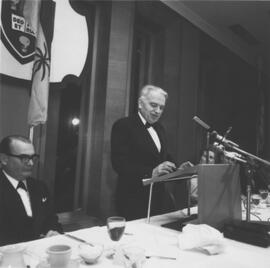Note on back: "Scholarship in the Modern World lecture series. Jean Sutherland Boggs speaks on 'Art History Today', during the Learned Societies Conference, U of S, 22 May-8 June, 1979".
Bio/Historical Note: Grace Jean Sutherland Boggs (1922-2014) was born in Negritos, Peru. Boggs attended Alma College in St. Thomas, Ontario, graduating in 1938. She would later receive a Bachelor of Arts degree from the University of Trinity College in 1942. She received a M.A. in 1946 and a Ph.D. in 1953 from Radcliffe College. From 1942-1944 Boggs was an education secretary for the Art Association of Montreal (today known as the Montreal Museum of Fine Arts). In 1948, she joined the faculty of Skidmore College as an assistant professor. From 1949-1952 she was an assistant professor at Mount Holyoke College. From 1954 to 1962 Boggs was an assistant and associate professor at the University of California. In 1962, she was appointed curator for the Art Gallery of Toronto. In 1964 she was appointed Steinberg Professor of Art History at Washington University in St. Louis. In 1966 Boggs was appointed the first female and fifth director of the National Gallery of Canada and served in this position until 1976. During her tenure, the Gallery collection grew by more than 8,600 pieces. including works from Degas, van Gogh, Pollock, the Group of Seven, and the beginnings of the Gallery's photography collection. From 1976-1979 she was a Professor of Fine Arts at Harvard University. From 1978-1982 she was the director of the Philadelphia Museum of Art. Under her leadership, the Museum purchased Edgar Degas's painting After the Bath, which is now considered to be one of the Museum's most important acquisitions in the post-war period. She also presided over the Museum during art historian Stella Kramrisch's acclaimed 1981 exhibition of Indian art, Manifestations of Shiva. She was chair and chief executive officer of the Canada Museums Construction Corporation from 1982-1985, where she directed the construction of both a custom-built National Gallery building and the unique Canadian Museum of Civilization (today known as the Canadian Museum of History) in collaboration with the architects Moshe Safdie and Douglas Cardinal. From 1991 to 1993 Boggs was a senior advisor for the Andrew W. Mellon Foundation. As an art historian, she has written books about the life of Edgar Degas, including Portraits By Degas (1962). In 1973, Boggs was made an Officer of the Order of Canada "in recognition of her scholarship and the vision and energy she has displayed in developing the collection and the services of the Gallery". She was promoted to Companion in 1992. In 1979 she was awarded an honorary Doctor of Literature from the University of Saskatchewan. She was awarded honorary degrees from Mount Holyoke College in 1971, York University in 1976 and from Concordia University in 2000. Boggs died in 2014 in Ottawa at age 92.
Bio/Historical Note: Learned Societies, a term applied in Canada to the large group of scholarly organizations that hold conferences annually from late May to mid-June at a different university location each year. Society members come not only to hear and discuss scholarly papers on the latest work in their fields, but also to renew contacts and share common concerns. The gathering of these associations in one place over one period is distinctively Canadian and owes more to practical evolution than to planning power. Selecting one site with suitable university accommodation was an answer to Canadian distance that allowed scholars more economical joint arrangements, let them attend meetings of societies besides their own, and encouraged them to visit varied geographical areas. The older Royal Society opened the way by moving from its Ottawa base to annual conferences at Montréal, Kingston or Toronto. Younger, more specialized associations - such as those in history, political science and economics - joined in, holding their own meetings along with, or just following, the senior scholarly society. By the 1930s the practice of holding an annual learned-conference period at a different site each year was well established, though such sites were usually in central Canada, where most larger universities were located. But in 1949 "the Learneds" went to Halifax, and soon afterwards to Winnipeg, Edmonton and Vancouver. In April 1996, the conference name was changed to the Congress of the Humanities and Social Sciences.

